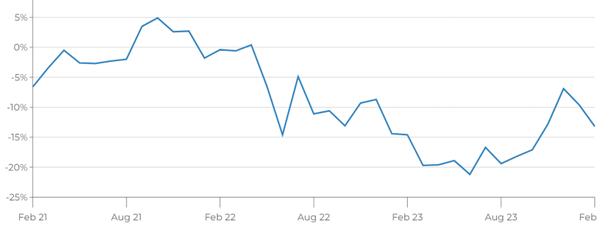The £10.9bn Scottish Mortgage Investment Trust’s board will make at least £1bn available for share buybacks during the next two years – the largest ever investment trust share buyback programme in absolute terms. The board is taking action to reduce the trust’s approximately 15% discount.
The new programme marks a significant ramp up in buybacks for the Baillie Gifford flagship trust, which bought back £353m of its shares during the past two years.
The trust’s discount over 3yrs

Source: Scottish Mortgage Investment Trust
Scottish Mortgage's discount is one of the widest amount its global peer group, according to Markuz Jaffe, an analyst at Peel Hunt.
“A significant commitment to tackling the discount in both absolute monetary terms and as a percentage of the company may help to provide reassurance to the market around capital allocation discipline and longer term ambitions for addressing the relatively weak share price, with today's commitment potentially representing a material step-up in the pace of buybacks compared to recent months,” Jaffe said.
The benefits of share buybacks include improved liquidity and an immediate boost to the net asset value per share. Scottish Mortgage’s chairman Justin Dowley said: “We remain committed to using share repurchases strategically to enhance liquidity in our shares and to seek to facilitate trading around net asset value. Our company has a strong balance sheet and its portfolio companies are delivering strong operational results.
“We are acting upon this investment opportunity by materially increasing the capital available to our liquidity policy over the next two years with the aim of maximising returns for our shareholders.”
Jefferies analyst Matthew Hose said the board had to bear in mind the trust’s debt levels and its 30% cap on private company exposure before committing to buybacks. “There is now headroom on both following a recovery in performance and action taken to reduce debt,” he said.
In recent months, the board has reduced invested borrowings to 13% of net assets, at an average interest rate cost of 3.2%.
Meanwhile, private companies currently represent 26.2% of the portfolio, which would rise to 28.3% after the share repurchases are completed, based on current market levels.
Jefferies is rating Scottish Mortgage a buy following the news. “Importantly, the programme likely reflects the board's confidence in the valuations of the private company holdings, and we also expect the buybacks to persist into narrow discount levels, as was the case when the board previously eliminated the discount in the 2012-2014 period,” Hose explained.
The trust’s managers see the current low valuations of its portfolio as a compelling buying opportunity.
FE fundinfo Alpha Manager Tom Slater, who manages the trust with Lawrence Burns, said: “We own a portfolio of established companies achieving rapid expansion, propelled by enduring structural trends. The stock market has yet to fully recognise their progress, which creates the opportunity for us to buy the portfolio for less than its market value. In doing so, we can provide liquidity and augment returns for our shareholders."
The trust is a third-quartile performer over one year and fourth-quartile over three years to 14 March 2024, compared to peers in the IT global sector, but remains a top-quartile performer over the past decade. Its largest holdings are ASML (which provides lithography technology to chipmakers), Nvidia and Amazon.





